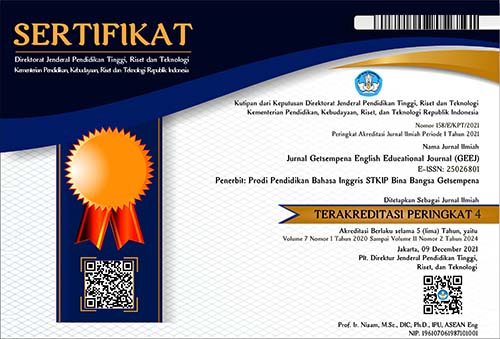TEACHING LISTENING BY USING ENGLISH POP SONG
Abstract
This thesis entitled, “Teaching Listening By Using English Pop Song (an experimental teaching to second grade of SMP Negeri 17 Banda Aceh)”. The purpose of this study is to find out the problem faced by students’ in listening, and to know the improvement of students’ listening. To find data and information in the field, the writer conducted the research at SMP Negeri 17 Banda Aceh. The participants were the second grade students which was about 28 students’. The writer collected some theories and opinions of expert from different resources to support this thesis. The writer also used some techniques in the data collecting process, such as questioner and experimental teaching. the data analysis of experiment group were 59,5 for pre test, and post-test 86,10. So, it can be concluded that Teaching listening by using English pop song is effective and can improve students ability listening.
References
Cameron, L. (2001). Teaching languages to young learners. Cambridge, England: Cambridge University Press.
Jolly, Y. S. (1975). The use of songs in teaching foreign languages. The Modern Language Journal, 59(1/2), 11-14.
Moriya, Y. (1988). English speech rhythm and its teaching to non-native speakers. Paper presented at the annual convention of Teachers of English to Speakers of Other
Languages, Chicago.
Murphey, T. (1992). Music and song. Oxford, England: Oxford University Press.
NIEHS Kids’ Pages. (2010). Retrieved from http://kids.niehs.nih.gov/
Ohata, K. (2004). Phonological differences between Japanese and English: Several potentially
problematic areas of pronunciation for Japanese ESL/EFL learners. Asian EFL Journal,
6(4). Retrieved from http://www.asian-efl-journal.com/december_04_KO.php
Purcell, J. M. (1992). Using songs to enrich the secondary class. Hispania, 75(1), 192-196.
Richards, J. (1969). Songs in language learning. TESOL Quarterly, 3(2), 161-174.
Shen, C. (2009). Using English songs: An enjoyable and effective approach to ELT. English
Language Teaching, 2(1), 88-94. Retrieved from www.ccsenet.org/journal.html
The Teacher’s Guide. (n.d.). Retrieved from http://www.theteachersguide.com
























